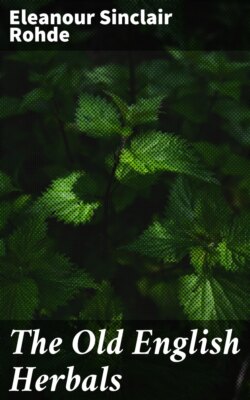Читать книгу The Old English Herbals - Eleanour Sinclair Rohde - Страница 7
На сайте Литреса книга снята с продажи.
Оглавление“Erce, Erce, Erce, Mother of Earth!
May the All-Wielder, Ever Lord grant thee
Acres a-waxing, upwards a-growing
Pregnant [with corn] and plenteous in strength;
Hosts of [grain] shafts and of glittering plants!
Of broad barley the blossoms
And of white wheat ears waxing,
Of the whole earth the harvest!
Let be guarded the grain against all the ills
That are sown o’er the land by the sorcery men,
Nor let cunning women change it nor a crafty man.”
And that other ancient verse:—
“Hail be thou, Earth, Mother of men!
In the lap of the God be thou a-growing!
Be filled with fodder for fare-need of men!”
It is of these two invocations that Stopford Brooke (whose translations I have used) writes: “These are very old heathen invocations used, I daresay, from century to century and from far prehistoric times by all the Teutonic farmers. Who ‘Erce’ is remains obscure. But the Mother of Earth seems to be here meant, and she is a person who greatly kindles our curiosity. To touch her is like touching empty space, so far away is she. At any rate some Godhead or other seems here set forth under her proper name. In the Northern Cosmogony, Night is the Mother of Earth. But Erce cannot be Night. She is (if Erce be a proper name) bound up with agriculture. Grimm suggests Eorce, connected with the Old High German ‘erchan’ = simplex. He also makes a bold guess that she may be the same as a divine dame in Low Saxon districts called Herke or Harke, who dispenses earthly goods in abundance, and acts in the same way as Berhta and Holda—an earth-goddess, the lady of the plougher and sower and reaper. In the Mark she is called Frau Harke. Montanus draws attention to the appearance of this charm in a convent at Corvei, in which this line begins—‘Eostar, Eostar, eordhan modor.’ … The name remains mysterious. The song breathes the pleasure and worship of ancient tillers of the soil in the labours of the earth and in the goods the mother gave. It has grown, it seems, out of the breast of earth herself; earth is here the Mother of Men. The surface of earth is the lap of the Goddess; in her womb let all growth be plentiful. Food is in her for the needs of men. ‘Hail be thou, Earth!’ I daresay this hymn was sung ten thousand years ago by the early Aryans on the Baltic coast.”
Even in a twelfth-century herbal we find a prayer to Earth, and it is so beautiful that I close this chapter with it:—
“Earth,[37] divine goddess, Mother Nature who generatest all things and bringest forth anew the sun which thou hast given to the nations; Guardian of sky and sea and of all gods and powers and through thy power all nature falls silent and then sinks in sleep. And again thou bringest back the light and chasest away night and yet again thou coverest us most securely with thy shades. Thou dost contain chaos infinite, yea and winds and showers and storms; thou sendest them out when thou wilt and causest the seas to roar; thou chasest away the sun and arousest the storm. Again when thou wilt thou sendest forth the joyous day and givest the nourishment of life with thy eternal surety; and when the soul departs to thee we return. Thou indeed art duly called great Mother of the gods; thou conquerest by thy divine name. Thou art the source of the strength of nations and of gods, without thee nothing can be brought to perfection or be born; thou art great queen of the gods. Goddess! I adore thee as divine; I call upon thy name; be pleased to grant that which I ask thee, so shall I give thanks to thee, goddess, with one faith.
“Hear, I beseech thee, and be favourable to my prayer. Whatsoever herb thy power dost produce, give, I pray, with goodwill to all nations to save them and grant me this my medicine. Come to me with thy powers, and howsoever I may use them may they have good success and to whomsoever I may give them. Whatever thou dost grant it may prosper. To thee all things return. Those who rightly receive these herbs from me, do thou make them whole. Goddess, I beseech thee; I pray thee as a suppliant that by thy majesty thou grant this to me.
“Now I make intercession to you all ye powers and herbs and to your majesty, ye whom Earth parent of all hath produced and given as a medicine of health to all nations and hath put majesty upon you, be, I pray you, the greatest help to the human race. This I pray and beseech from you, and be present here with your virtues, for she who created you hath herself promised that I may gather you into the goodwill of him on whom the art of medicine was bestowed, and grant for health’s sake good medicine by grace of your powers. I pray grant me through your virtues that whatsoe’er is wrought by me through you may in all its powers have a good and speedy effect and good success and that I may always be permitted with the favour of your majesty to gather you into my hands and to glean your fruits. So shall I give thanks to you in the name of that majesty which ordained your birth.”
FROM A SAXON HERBAL
(Harl. 1585, folio 19a)
